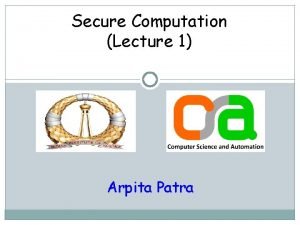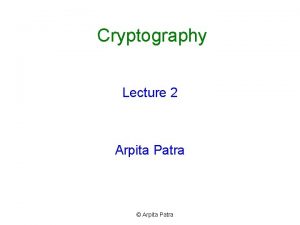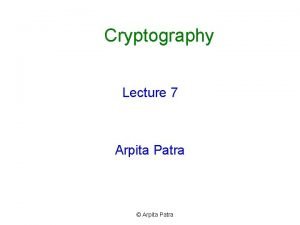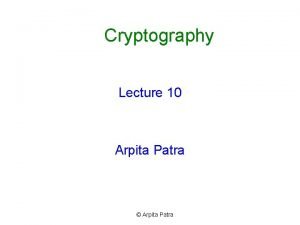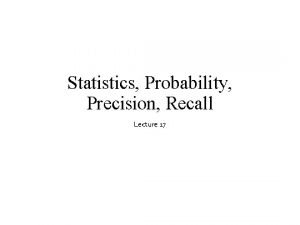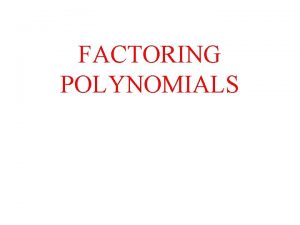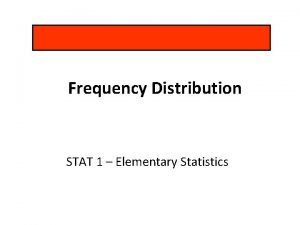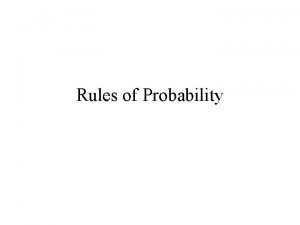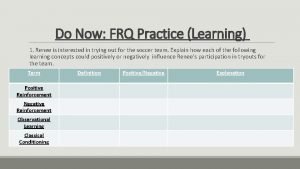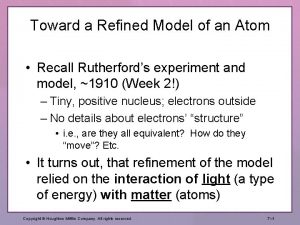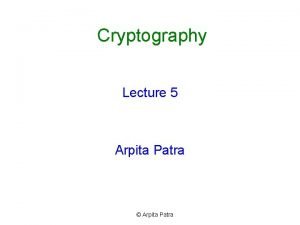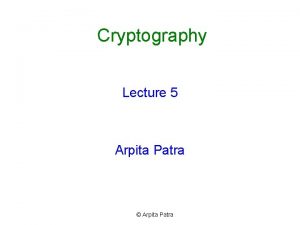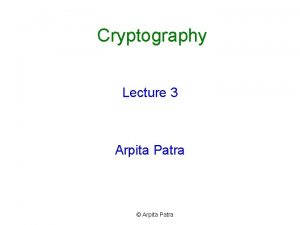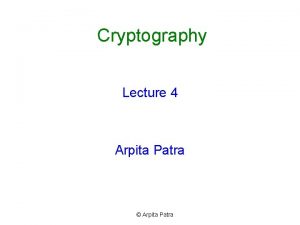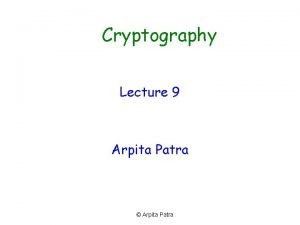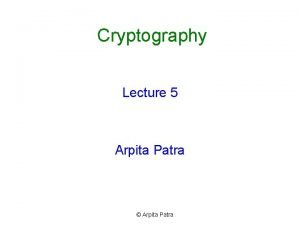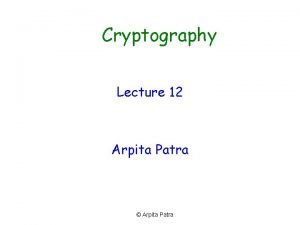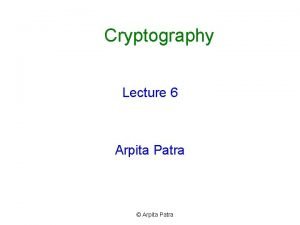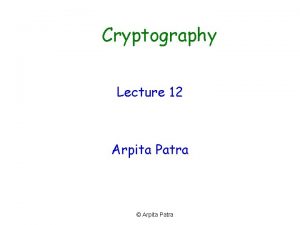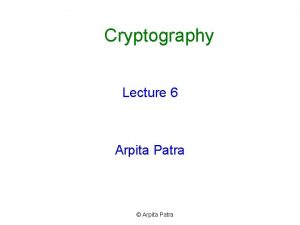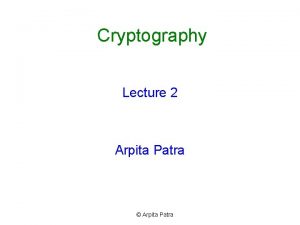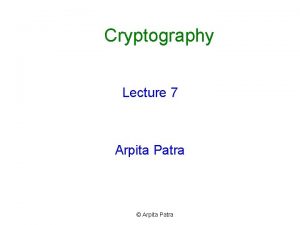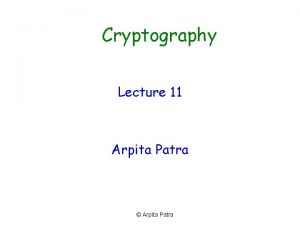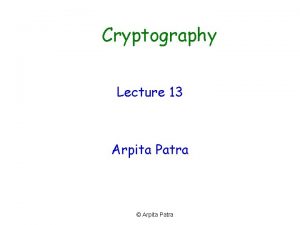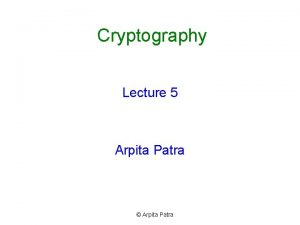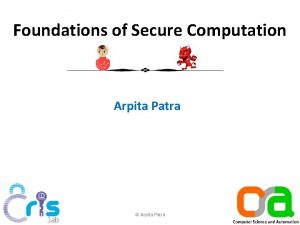Cryptography Lecture 12 Arpita Patra Arpita Patra Recall



































- Slides: 35

Cryptography Lecture 12 Arpita Patra © Arpita Patra

Recall - If PRG exists, then so does PRF o Construction of PRF using PRG o Introduction to Hybrid Proof Technique o Proof

Today’s Goal - One-way Functions (OWF) & One-way Permutations (OWP) o Definition o Do they exist? o Candidate OWF o Recall def. of PRG, PRF. Which out of the three looks simpliest - Hard-core Predicates of OWF/OWP o Definition o Non-triviality of finding it. o Hard-core predicates from OWF/OWP (Goldreich-Levin Theorem) – partial proof - Roadmap of constructing PRG for poly expansion factor from OWF + Hard-core predicate

One-Way Functions (OWF) q Functions that are easy to compute but “difficult” to invert (almost-always) f: {0, 1}*

One-Way Functions (OWF) y = f(x) x {0, 1}* Easy task: Polynomial in |input| {0, 1}*

One-Way Functions (OWF) x = f-1 (y) y {0, 1}* Difficult task {0, 1}*

The Inverting Experiment Invert (n) A, f f: {0, 1}* x R {0, 1 }n PPT A(1 n) y = f(x) x’ I can invert f on any input A’s guess about pre-image of y f(x’) = 1 --- A won y Game Output f(x’) y Let me verify 0 --- A lost - A need not have to find the original x to win the game --- sufficient to find one pre-image

OWF: Mathematical Formulation f: {0, 1}* Function f is a OWF if the following two conditions hold : - Easy to compute: for every x {0, 1}*, f(x) can be computed in poly(|x|) times - Hard to Invert: For every PPT algorithm A, there is a negligible function negl() : Pr Invert (n) A, f = 1 negl(n) Pr [ A(f(x), 1 n) f-1(f(x))] negl(n) x {0, 1}n q OWF does not exist in the realm of unbounded powerful adversary. - Any function is invertible in principle given enough time/computational power. - The assumption of existence of OWF is about computational hardness.

Functions that are not one-way (non-OWFs) Pr Invert = 1 negl(n) A, f Pr [ A(f(x), 1 n) f-1(f(x))] negl(n) x {0, 1}n For a function to be non-OWF, there should exist an A, p(n) s. t x {0, 1}n Example I: Consider f s. t. Pr [ A(f(x), 1 n) f-1(f(x))] x {0, 1}n 3/4 f is not one-way Example III: f(x) = x 1 x 2……xn-1, where x {0, 1}n Pr [ A(f(x), 1 n) f-1(f(x))] = 1/2 x {0, 1}n > 1/n 10 when n is even negl(n) when n is odd Example II: f(x, y) = x. y, where x, y N Pr [ A(f(x, y), 1 n) f-1(f(x, y))] x, y {0, 1}n/2 f is not one-way

Do OWFs Exist? q No unconditional proof of their existence yet. - Proof is hard because - Finding a proof will lead to solving the million dollar question in CS whether P = NP or not q Whole world believes that they do and so existence of OWF is an assumption/conjecture - Several noteworthy computational problems (int. factorization) received intensive attention since ages (even before crypto was born) but no poly time algo is found. > The former suggests every PPT algo must fail to solve at least for one input > The latter suggests every PPT algo must fail to solve ALMOST ALWAYS (for any random input) - Being NP-complete is not enough to be a candidate OWF - Belief that OWF exists is much more than believing P NP

Candidate OWFs q Subset Sum Problem: q Integer Factorization: f(x, y) = xy : x and y are equal length primes.

One-Way Permutation (OWP) f: {0, 1}* q Function f is length-preserving if |f(x)| = |x| for all x Ø Size of the image and pre-image are the same q Function f is a OWP if it it is a OWF and Ø Length-preserving Ø One-to-one mapping q If f is a OWP then every y has a unique pre-image x Ø Still finding x should be hard in polynomial time {0, 1}*

Hard-Core Predicates q Let f: {0, 1}* be a OWF - Given y = f(x) for a random x, computing the entire x is hard - Does this mean nothing about x can be determined from f(x) ? q Given f, define g as follows: - g(x 1, x 2) = (x 1, f(x 2)), where |x 1| = |x 2| - g too is OWF (otherwise inverter of g can be used to invert f) !! - but it leaks half of its input !! q In general, f(x) does NOT hide everything about x. q But, f(x) must hide something about x (otherwise computing x would have been easy) - “something” that remains hidden about x even given f(x) is captured by hard-core predicates - They are one bit of info about x that is hard to guess given f(x). - Modelled as a Boolean function: hc: {0, 1}* {0, 1}

Hard-Core Predicates - Let f: {0, 1}* be ANY function (need not be a OWF) - Let hc: {0, 1}* {0, 1} be a Boolean function Function hc is a hard-core predicate for the function f if the following holds: - Given x, the value hc(x) can be computed in polynomial (in input size) time - Pr [ A(f(x), 1 n) = hc(x)] ½ + negl(n) x {0, 1}n q Hard-core Predicate may exist even for functions that are NOT one-way - Non-OWF: f(x 1, …, xn) = (x 1, …, xn-1) - hc(x 1, …, xn) = xn - For a RANDOM x, given f(x 1, …, xn), hc(x 1, …, xn) can be guessed with prob. ½ q We are NOT interested in hard-core predicates of functions that are NOT one-way.

Hard-Core Predicates for Permutations - Let f: {0, 1}* be a permutation - Let hc: {0, 1}* {0, 1} be a Boolean function Function hc is a hard-core predicate for the permutation f if the following holds: - Given x, the value hc(x) can be computed in polynomial (in input size) time - Pr [ A(f(x), 1 n) = hc(x)] ½ + negl(n) x {0, 1}n q Does hardcore predicates exist for permutations that are not one-way - Not possible CT 16 (one): If a one-to-one function has hard-core predicate then it must be one-way.

Finding HCPs for OWF/OWP is not Simple q Let f: {0, 1}* be a OWF - Given f(x 1, …, xn) for a random x = x 1, …, xn, at least one of the bits of x must be hidden --- as f is a OWF - So computing x 1 … xn from f(x 1, …, xn) must be hard - So hc(x 1, …, xn) = x 1 … xn is a hard-core predicate for f q Consider g constructed using f - g(x 1, …, xn) = (f(x 1, …, xn), x 1 … xn) - g is a OWF (else f is not a OWF; proof by reduction) - hc(x) = x 1 … xn is not a HCP for g q For a given fixed Boolean function hc(x), there always exist a OWF f such that hc is not a hard-core predicate for the function f

Does HCP exist for any OWF? q No proof yet. q Given a OWF f, we can construct a OWF g and its HCP. Weaker yet sufficient for our purpose Theorem (Goldreich-Levin): Assume OWF (OWP) exists, then there exists a OWF (OWP) g and a hard-core predicate hc for g. - Let f be a OWF/OWP - g(x, r) = (f(x), r), where x = x 1, …, xn and r = r 1, …, rn. - hc(x, r) = r 1 x 1 … rnxn is a hard-core predicate for the function g Theorem (Goldreich-Levin): Let f be a OWF/OWP and define g by g(x, r) = (f(x), r), where x = x 1, …, xn and r = r 1, …, rn. Then the Boolean function hc(x, r) = r 1 x 1 … rnxn is a hard-core predicate for the function g

Roadmap PRF OWF/P g, hc OWF/P f

Goldreich Levin Theorem (Goldreich-Levin): Let f be a OWP and define g by g(x, r) = (f(x), r), where x = x 1, …, xn and r = r 1, …, rn. Then the Boolean function hc(x, r) = r 1 x 1 … rnxn is a hard-core predicate for the function g A A’ Proof: Difficulty Level ***** x {0, 1}n Pr[A’(f(x)) = x))] = 1 x, r {0, 1}n *** * x, r {0, 1}n Pr[A(f(x), r) = hc(x, r)] = 1

GL Theorem: The Most Simple Case (*) - g(x, r) = (f(x), r), x = x 1, …, xn and r = r 1, …, rn. - hc(x, r) = r 1 x 1 … rnxn Pr[A’(f(x)) = x))] = 1 Pr[A(f(x), r) = hc(x, r)] = 1 A A’ f(x 1, …, xn), (1, 0, …, 0) Aha! x 1 Aha! x 2 x 1, …, xn Aha! xn x 1 0 … 0 f(x 1, …, xn), (0, 1, …, 0) 0 x 2 … 0 f(x 1, …, xn), (0, 0, …, 1) 0 0… xn

GL Theorem: The Most Simple Case (*) - g(x, r) = (f(x), r), x = x 1, …, xn and r = r 1, …, rn. - hc(x, r) = r 1 x 1 … rnxn Why 1: guarantee t o n s e o D rrect for o c e r a s c the h it always e b y a m ; sure 0) , 0 , … , 0 , 1 ( fails for r= x, r {0, 1}n x {0, 1}n A’ f(x 1, …, xn) Aha! x 1 Aha! x 2 Why 2: r can Adv’s powe en queried h w d e v ie tr f(xre 1, …, xn), m(1, 0) re r’s he…, r (0, o d n a r n o ndom) ot 0 ra… arex n 0 1 f(x 1, …, xn), (0, 1, …, 0) 0 x 2 … 0 f(x 1, …, xn), (0, 0, …, 1) x 1, …, xn Aha! xn 0 0… xn A

GL Theorem: The Moderately Simple Case (***) - g(x, r) = (f(x), r), x = x 1, …, xn and r = r 1, …, rn. - hc(x, r) = r 1 x 1 … rnxn x, r {0, 1}n x {0, 1}n A’ f(x 1, …, xn) A f(x 1, …, xn), r = (r 1, r 2, …, rn) x 1 r 1 … xn rn The r’s in both are random (but not f(x 1, …, xn), r (1, 0, …, 0) independent)! x 1 r’ 1 … xn rn Aha! x 1 Aha! xi -> Flip the ith bit in the second query But we are not sure if in both the queries returned hcs are correct.

GL Theorem: The Moderately Simple Case (***) - g(x, r) = (f(x), r), x = x 1, …, xn and r = r 1, …, rn. - hc(x, r) = r 1 x 1 … rnxn Lemma: If n be such that x, r {0, 1}n A’ f(x 1, …, xn) A f(x 1, …, xn), r = (r 1, r 2, …, rn) x 1 r 1 … xn rn The r’s in both are random (but not f(x 1, …, xn), r (1, 0, …, 0) independent)! x 1 r’ 1 … xn rn Aha! x 1 Then S Domain of x of length n

GL Theorem: The Moderately Simple Case (***) - g(x, r) = (f(x), r), x = x 1, …, xn and r = r 1, …, rn. - hc(x, r) = r 1 x 1 … rnxn Theorem: If we have A, p(n) s. t. for infinitely many n’s x, r {0, 1}n Let n be s. t. x, r {0, 1}n Then we can construct A’ s. t. x {0, 1}n Then we have A’ s. t. x {0, 1}n for infinitely many n’s

GL Theorem: The Moderately Simple Case (***) - g(x, r) = (f(x), r), x = x 1, …, xn and r = r 1, …, rn. - hc(x, r) = r 1 x 1 … rnxn r {0, 1}n Then we can construct A’ s. t. for every x in S Union Bound over n bits Then we can construct A’ s. t. for every x in S x {0, 1}n

GL Theorem: The Moderately Simple Case (***) - g(x, r) = (f(x), r), x = x 1, …, xn and r = r 1, …, rn. - hc(x, r) = r 1 x 1 … rnxn r {0, 1}n Then we can construct A’ s. t. for every x in S Union Bound over n bits Then we can construct A’ s. t. for every x in S Easy prob. calculation Then we can construct A’ s. t. x {0, 1}n Pr[A’(f(x)) = x))] x {0, 1}n x {0, 1}n = 1/4 p(n)

GL Theorem: The Moderately Simple Case (***) - g(x, r) = (f(x), r), x = x 1, …, xn and r = r 1, …, rn. - hc(x, r) = r 1 x 1 … rnxn r {0, 1}n Prob. Boosting/Amplification technique Then we can construct A’ s. t. for every x in S Union Bound over n bits Then we can construct A’ s. t. for every x in S Easy prob. calculation Then we can construct A’ s. t. x {0, 1}n Pr[A’(f(x)) = xi] = r {0, 1}n -m/2(p(n))2 (Chernoff Bound) Find m from e -m/2(p(n))2 = 1/2 n Repeat m times (w. r. t random r) and take majority

GL Theorem: The Moderately Simple Case (***) - g(x, r) = (f(x), r), x = x 1, …, xn and r = r 1, …, rn. - hc(x, r) = r 1 x 1 … rnxn x {0, 1}n r {0, 1}n A’ A f(x 1, …, xn), r = (r 1, r 2, …, rn) x 1 r 1 … xn rn f(x 1, …, xn), r (1, 0, …, 0) x 1 r’ 1 … xn rn Aha! x 1, …, xn Find x 1 and take majority Repeat m times with random r Repeat for each i

GL Theorem: The Moderately Simple Case (***) - g(x, r) = (f(x), r), x = x 1, …, xn and r = r 1, …, rn. - hc(x, r) = r 1 x 1 … rnxn Theorem: If we have A, p(n) s. t. for infinitely many n’s x, r {0, 1}n Let n be s. t. x, r {0, 1}n Why ¾ will be clear here. r {0, 1}n Then we can construct A’ s. t. x {0, 1}n Then we have A’ s. t. Pr[A’(f(x)) = x] ≥ 1/4 p(n) x {0, 1}n for infinitely many n’s

GL Theorem: The Moderately Simple Case (***) - g(x, r) = (f(x), r), x = x 1, …, xn and r = r 1, …, rn. - hc(x, r) = r 1 x 1 … rnxn Let n be s. t. x, r {0, 1}n Why ¾ clear ? Union Bound & Easy prob. calculation r {0, 1}n r {0, 1}n

GL Theorem: The Moderately Simple Case (***) - g(x, r) = (f(x), r), x = x 1, …, xn and r = r 1, …, rn. - hc(x, r) = r 1 x 1 … rnxn Let n be s. t. x, r {0, 1}n (moderately) Easy prob. calculation r {0, 1}n Union Bound & Easy prob. calculation r {0, 1}n Pr[A(f(x), r) = hc(x, r)] x, r {0, 1}n r {0, x 1}n r {0, 1}n r {0, 1}n

GL Theorem: The Moderately Simple Case (***) - g(x, r) = (f(x), r), x = x 1, …, xn and r = r 1, …, rn. - hc(x, r) = r 1 x 1 … rnxn Theorem: If we have A, p(n) s. t. for infinitely many n’s x, r {0, 1}n Let n be s. t. x, r {0, 1}n Then we can construct A’ s. t. x {0, 1}n Then we have A’ s. t. Pr[A’(f(x)) = x] ≥ 1/4 p(n) x {0, 1}n for infinitely many n’s

Roadmap PRF OWF/P g, hc OWF/P f

CT 17 (one): If f is a OWF, then prove or disprove that g(x) = (f(x), f(f(x))) is a OWF. CT 18 (two): If there exists a PRF that maps n-length key and input to 1 -bit output, then there exists a PRF that maps n 2 -length key and n-bit input to n-bit output CT 19 (one): If G: {0, 1}n+1 is a PRG, then G is a OWF.

 Matchmaking
Matchmaking Recallcrypto. com
Recallcrypto. com 01:640:244 lecture notes - lecture 15: plat, idah, farad
01:640:244 lecture notes - lecture 15: plat, idah, farad Cipher patra
Cipher patra Cipher patra
Cipher patra Sudhakar patra
Sudhakar patra Akshaya patra donation online
Akshaya patra donation online Sudhakar patra
Sudhakar patra Lesní patra
Lesní patra Goutam patra
Goutam patra Rostlinná patra
Rostlinná patra Bhansar pragyapan patra
Bhansar pragyapan patra Era of quality at the akshaya patra foundation
Era of quality at the akshaya patra foundation Total recall vr
Total recall vr Precision recall statistics
Precision recall statistics Recall
Recall Recall the different methods of factoring polynomials
Recall the different methods of factoring polynomials Fdt statistics
Fdt statistics Neocate formula recall
Neocate formula recall Recall the rules of probability
Recall the rules of probability Beef recall
Beef recall Can hypnosis enhance recall of forgotten events
Can hypnosis enhance recall of forgotten events 3 step recall method
3 step recall method Gianttoby
Gianttoby Difference between recognition and recall
Difference between recognition and recall Number matrices woodcock johnson description
Number matrices woodcock johnson description Aviane recall
Aviane recall Marketing concept map
Marketing concept map Moment of recall
Moment of recall Recall vs recognition
Recall vs recognition Recall coordinator
Recall coordinator Recall column
Recall column Precision in information retrieval
Precision in information retrieval What is active recall
What is active recall Recall what an atom is.
Recall what an atom is. Recall
Recall
